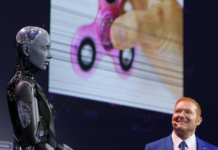
(By Georgia Beasley) I began writing this column after engaging in a debate over what is considered an acceptable dress code for the workplace by our traditional industry standards. Per usual, I was the only Millennial, so my opinion was not exactly the fan favorite, but since that day I’ve continued to ask myself: Does success have a dress code? Furthermore, if I want to be successful today, does that mean I have to look successful by the standards of previous generations? Millennials are redefining what it looks like to be successful, so it may be time for the radio industry to follow our lead.
In researching this topic, I spoke with multiple companies in the industry and the feedback varied based on geography, market size, format, and obviously, the company. One industry colleague said they just implemented a casual dress code because it allows for employees to be more comfortable in how they work, which leads to a more positive work environment and culture.
We are currently in an employee-driven market and our industry must be competitive for talent, especially Millennial talent. We’re constantly striving to attract, cultivate, and develop the right talent on our team. Whether it’s more money, working remotely, or even additional vacation time, we typically do whatever it takes once we find the right person for an available position. Of course, everyone wants more money, but we Millennials want perks that enhance workplace culture, such as a more casual dress code. This may be a new tiebreaker for radio to use as a benefit.
Companies like Apple, Google, and Facebook, make it clear that one’s business attire does not equate to being an executive or having a certain level of professionalism. If anything, we are now seeing more frequently that it can be off-putting when “the suits” show up to a business and the owner is dressed casually. Companies are now saying what matters most is being professional, not looking professional.
I spoke to another colleague in the industry who encourages his team to use their judgment because they are their own business. Good sellers are chameleons and capable of adapting to their environment. There can be a hybrid dress code, one for internal and one for external responsibilities. The dress code could even reflect the seller’s list and actually lead to more business. Tattoos and jeans might be fine for a seller who focuses on clubs and more creative-driven agencies. In fact, this could lead to MORE dollars spent because the clients feel comfortable and trust is built.
Keep in mind, I don’t think Millennials inherently understand what “too casual” means, so if you’ve made the decision to implement a more casual dress code for all the aforementioned reasons, it’s important that there still be specific guidelines. You might enlist several talented Millennials to assist in laying out these guidelines. Make sure to be more specific about what is unacceptable versus what is acceptable. There are always individuals who push the envelope, but creating some clear guidelines will also be helpful for those workers who just don’t know, regardless of generation. It’s important for companies to make sure that everyone in the organization knows what the actual policy is up front and set a benchmark. It’s up to the employers to educate their employees as to what their interpretation is of the dress code; so while it may exist as a section in their handbook, it’s especially important to share this during the new hire/HR introductory meetings.
Our industry can be casual but that doesn’t mean sloppy. We can be flexible but not overly flexible. A looser, yet professional dress code internally could in fact improve morale. A casual dress code did nothing to negatively impact Apple, Microsoft, Facebook, and many others. Millennials gravitate to these types of companies because they allow for authenticity. A less restrictive dress code gives us the ability to show our personality, which will translate to more confidence in our role with the company. Furthermore, if we are encouraged to be our authentic selves, trust and loyalty tend to also exist.
Georgia Beasley is Director of Digital Sales for the Beasley Media Group and can be reached by e-mail at [email protected]






Other commentators here have a point–Georgia is a Beasley, which means she can never be fired from Beasley. We are sure she means well, but what she has to say is not realistic or relevant to the vast majority who must produce and are held accountable every day. Nepotism erodes the credibility of those who are part of that, in any company or business. Those that go beyond the family business, and succeed and prove themselves in an objective business climate have far far more credibility.
I couldn’t read a story with this title in context to the subject. Success does have a dress code. It’s called dressing like your company wants you to dress until you own the company.
100% agree Alan
Did you see her name? She DOES own the company.